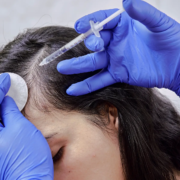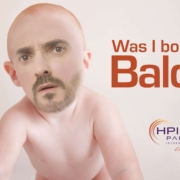Exosomes & Hair Regrowth: Is the Hype Real?
Hair loss can be frustrating, especially when topicals and pills don’t deliver. A new option creating buzz is exosome therapy, a treatment still in its early stages but showing real scientific promise. Here’s what you need to know, straight from the latest research and our clinical perspective at HPI Hair Partners.
What Exactly Are Exosomes?
Your cells send “text messages” to each other throughout the day. Those messages are packed inside exosomes—tiny, bubble-like packages filled with proteins, lipids, and genetic material. When an exosome docks with another cell, it delivers the growth and repair instructions.
Why Exosomes Interest Hair-Loss Specialists
1. Wake up dormant follicles
Exosomes taken from dermal papilla cells (the “command center” of each follicle) can push resting follicles back into the growth phase.
2. Improve scalp circulation
They trigger angiogenesis—new blood-vessel formation—so follicles receive more oxygen and nutrients.
3. Quiet damaging signals
Early lab work shows exosomes may offset the DHT-driven miniaturization seen in androgenetic alopecia.
What the Studies Say
| Study Type | Key Takeaway |
| Human trial, 39 patients | Adipose-derived exosomes increased hair density and thickness by week 12. |
| Human pilot, 9 men | Seven reported visible regrowth they called “satisfying.” |
| Mouse study, dermal papilla exosomes | Accelerated regrowth via the Wnt/β-catenin pathway (a master follicle switch). |
| Mouse study, milk-derived exosomes | Matched minoxidil’s growth effect—without scalp irritation. |
Full citations at the end of the article.
Safety & Current Limits
- Side-effect profile: 125 treated hair-loss patients across published studies reported only mild, temporary reactions—yet in wider dermatology use, ten serious events have been logged.
- Quality control: Manufacturing methods vary. Until FDA standards tighten, each product’s purity and dose can differ.
- Cost & access: Cell-derived exosomes are expensive to produce, which raises treatment price tags.
Should You Try It?
Exosome therapy is still considered experimental. If you explore it, ask the clinic:
- What source? (Adipose, bone marrow, milk, plant?)
- Any peer-reviewed data on that product?
- How is sterility and dosing verified?
At HPI Hair Partners, we stay evidence-led. We’re closely monitoring exosome research and will introduce it only when safety, sourcing, and efficacy meet our standards—and yours.
Your Next Step
Every scalp is different. Let’s discuss the proven options available now and create a plan that aligns with your goals and timeline.
Book a confidential consultation →
Have questions first? Email our trichology team at customercare@hpihairpartners.com. We’re here to help.
Sources
- Beer, S. et al. “Exosomes and regenerative medicine: a review focused on hair disorders.” PubMed 2024.
- Kim, J. et al. “Adipose-derived stem-cell exosomes promote hair regrowth in humans.” International Journal of Molecular Sciences 2023.
Moawad, M. et al. “Milk-derived exosomes as a novel therapeutic for alopecia.” Journal of Dermatological Science 2022.












